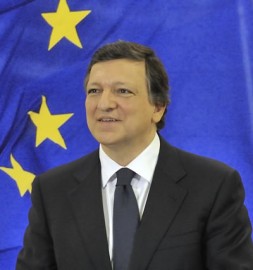
An excellent speech by President Barroso this evening at Chatham House, in the Third Hugo Young Memorial Lecture. (The speech was trailed in the Guardian this morning here and reported by the BBC here.)
The bit of the speech that made most of the news was President Barroso’s apparent message to the British party leaders that they could sulk on the sidelines or lead from the centre. It’s an important message, but a pity that it takes a foreign politician to say it. What’s wrong with foreigners, I hear you ask. Nothing, except that the British reluctance to engage with Europe can in the end only be solved by British politicians, not foreign ones. The president himself suggested perhaps that the British reluctance to take a lead was down to our “natural modesty”.
But that’s enough about Britain, what about Europe? He spoke of the need for deregulation; he wanted to fill the gap between the institutions and the citizen; he thought that the role of the national level in filling that gap was crucial. He was adamant that leadership was vital: a second appeal to the British party leaders to lead on Europe, perhaps.
He spoke of the importance of the constitution (but not the label that was attached to it) and also the importance of a “democratic method” for building Europe. He said this in an answer to a question about the citizens’ initiative (Article I-47 in the constitutional treaty) which he welcomed. Whether he would extend this welcome to a citizens’ initiative for a European referendum on the constitution, I didn’t get the chance to ask.
On Russia, he was clear that a coherent and united message to President Putin was important, but made the point that such coherence was not in his gift. The forthcoming summit would involve all 27 heads of national government as well as himself: if there was no coherence, it was because the 27 did not agree. He could ask them to agree, but he could not force them.
A great speech. You can read it here.
